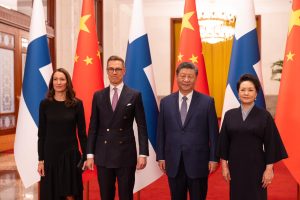As Finland marks the 74th anniversary of diplomatic ties with China, President Alexander Stubb’s recent state visit from October 28 to 31 underscored both continuity and change in a relationship shaped by evolving global tensions. Over his four-day visit, Stubb navigated a complex landscape of trade relations, security concerns, and strategic cooperation, seeking to position Finland as a self-interested yet principled partner in an increasingly polarized world.
Economic Stakes Amid Strategic Divergence
Accounting for 13.8 percent of Finland’s global trade, China ranked as Finland’s fourth largest trading partner in 2023, after Germany, Sweden, and the United States. Some 250 Finnish companies are operating in China, and there are significant Chinese investments in Finland by companies like Huawei and Tencent. Helsinki Airport ranks as one of the EU’s top passenger hubs for Europe-China air travel.
At the same time, Finland’s trade deficit with China has been growing over the past years as exports fell by 12 percent in 2023. The trade deficit has now reached about half of the bilateral trade volume and continues to expand. Meanwhile, Finland’s exports to China increasingly include commodities such as wood pulp from Finnish forests and nickel. So, while China-Finland trade relations remain significant, they also represent challenges that underscored Stubb’s recent state visit.
With a weaker Finnish economy, and a decelerating Chinese economy, it is understandable that both sides sought to highlight their complementarity and potential for business cooperation in green and digital technologies by signing various agreements emphasizing sustainable growth, technology, and education, while avoiding more politically sensitive areas like Arctic cooperation.
For example, the 2025-2029 action plan adopted during Stubb’s visit is leaner than the previous one, focusing on less sensitive cooperation areas like green tech, health, food, education and tourism. Notably, Arctic cooperation, a once-celebrated aspect of Sino-Finnish collaboration, has shifted as Finland opted instead for partnerships with the United States and Canada on Arctic projects, reflecting a deepened North Atlantic security alignment.
Other agreements signed during the visit also include long-awaited access for Finnish poultry exports to China, symbolizing the economic necessity driving Finnish trade policy. Additionally, an agreement in engineering education between Finnish universities of Applied Sciences and Tsinghua University is expected to foster mutually beneficial but low-risk exchanges. These steps reflect a recalibrated approach where Finland seeks economic opportunities in China while prudently managing the geopolitical risks that accompany them.
Finland’s New “Value-Based Realism”
This is consistent with Stubb’s “value-based realism,” a foreign policy approach that recognizes the critical importance of maintaining Finnish economic interests without jeopardizing its security links with OECD democracies. Having recently joined NATO, Finland now faces the delicate task of balancing its commitments to the EU and the U.S. with its pragmatic trade-focused approach to China. And indeed, while Stubb raised security concerns of Finland and Europe in an increasingly polarized world, the Finnish business delegation sought to promote exports to China.
While Stubb underscored Finland’s commitment to open dialogue with China, he was clear in his warnings that China’s alignment with Russia in the Ukraine conflict could further risk its trade ties with the EU, China’s second largest export market after the United States. At Fudan University, he spoke about the importance of making more efforts to secure global peace, by finding ways to reform the multilateral order and the United Nations by allowing emerging countries of the Global South to have a stronger voice to overcome destructive ideological divisions.
Meanwhile, Finland’s business sector remains cautious. Companies like Nokia and KONE, with longstanding operations in China, are concerned that ongoing securitization trends may complicate access to Chinese markets. These tensions illustrate the delicate balance Finland must maintain: upholding trade relationships while staying aligned with the strategies of the EU and NATO that are increasingly focused on technology security and geoeconomic resilience.
From Pragmatism to Realism
For analysts from larger OECD democracies like the United States or France, it is important to understand that Finland’s tightrope diplomacy with China is based on its situation as a small state. Stubb’s diplomatic rhetoric affirmed bilateral trade interests without compromising Finland’s broader strategic priorities. It is this reality that reflects Finland’s differentiated alignment with the European Union’s view of China as both a necessary trade partner and a “systemic rival.” This nuanced stance is believed to allow Finland to safeguard economic ties with China without undermining NATO obligations or EU solidarity.
Stubb’s visit came at a time when Finland’s relationship with China, once framed by pragmatic optimism about Chinese markets, has cooled significantly. In recent years, China’s assertive foreign policy, combined with its strategic alignment with Russia, has prompted Finnish policymakers to reassess ties. Following its 2021 Governmental Action Plan on China, Finland has adopted a more cautious approach, acknowledging China’s influence activities and aligning more closely with EU standards on security and economic resilience. This realignment signals Finland’s intent to safeguard national interests within the broader EU and NATO frameworks.
Moreover, Finland’s emerging partnerships with Northeast Asian democracies underscore a shared strategic interest in countering the influence of authoritarian states. Stubb’s warnings about China’s growing proximity to Russia and North Korea’s recent involvement in the Ukraine conflict resonate deeply with Finland’s own security concerns.
At 74 years, the Finland-China relationship has become rooted in a more careful balance of economic and strategic interests. Stubb’s approach, a blend of principled pragmatism, highlights Finland’s commitment to maintaining dialogue without compromising its security priorities. As China’s relations with democracies continue to evolve, Finland’s “value-based realism” may offer inspiration particularly for small states that seek to navigate the challenging waters of economic and security interdependence.
































